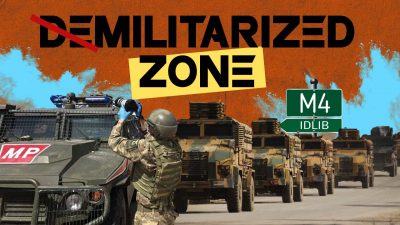Video: Idlib Question and Prospects of New Syrian-Turkish Confrontation

The southern part of Greater Idlib remains the main point of instability in Syria. The military situation, which had temporarily stabilized after the end of the Turkish attack on the Syrian Army codenamed “Operation Spring Shield”, is once again deteriorating. And this time it seems that even the Turkish leadership, who have made extensive efforts to defend the so-called ‘moderate opposition’, incidentally consisting mostly of al-Qaeda terrorists, from the bloody Assad regime, is forced to admit this.
On March 5, Turkey and Russia signed a de-escalation deal that put an end to the open military confrontation in Idlib between the Syrian Army and the Turkish Army and formally created a demilitarized zone along the M4 highway between the towns of Saraqib and Jisr al-Shughur.
Under the deal, heavy weapons and radical militant formations had to be withdrawn from the demilitarized zone, Russia and Turkey launched joint patrols along the M4 and the highway was to be reopened for civilian traffic. The south part of the M4 highway was formally the zone of Russian responsibility, whereas the north part was the Turkish one. As of early September however, the majority of the points of this deal have not been implemented. Radicals, members of Hayat Tahrir al-Sham and other al-Qaeda-linked groups such as the Turkistan Islamic Party and Houras al-Din still remain deployed in the supposed demilitarized zone. No heavy weapons were withdrawn and the M4 highway has not been reopened. Artillery duels and firefights regularly erupt on the contact line between the Syrian Army and militants protected by Turkey. Joint Russian-Turkish patrols regularly become targets of attacks by Turkey’s own proxies.
On September 1, Russia and Turkey even started a series of drills simulating the repelling of attacks on joint patrols on the M4, including the neutralization of subversive groups, the evacuation of damaged equipment and the provision of medical help to injured personnel.
Clearly, this does not look like a successful implementation of the March 5 deal. At the core of the issues are the contradictions existing between Turkey and the Iranian-Syrian-Russian alliance. Ankara is not interested in neutralizing the Idlib terrorists because they are the core of its influence in northwestern Syria. Without these groups, even the current Turkish military contingent deployed in Idlib would not be enough to keep the territories they have seized under control. Expansion into northern and northwestern Syria are open goals of President Erdogan and his Neo-Ottoman project. The neutralization of terrorists, the political settlement of the conflict and the stabilization of Syria promoted by the other side of this deal goes contrary to Turkish tactical interests.
In these conditions, it does not look like joint drills along the M4 will be enough to deal with the situation. Further to these, the sides could agree on several long- and mid-term steps that would allow for progress in the demilitarization and de-escalation processes to be achieved. These could include the following elements:
- To assign two officers, one Turkish and one Russian, to their own zone of responsibility where they would be jointly responsible for the implementation of the March 5 agreement on the ground. This should remove potential barriers and bureaucratic hurdles in their communication.
- To avoid potential duplication or clashing in the actions of the sides during the implementation of the demilitarized agreement, each side should identify one authorized officer to make decisions and be responsible for the implementation of the deal on the ground.
- To form a joint military, diplomatic and information group to work on the development of a joint Russian-Turkish position regarding the situation in the M4 zone, to release official comments on developments, including attacks and other incidents and to develop ways to implement the deal.
In a 3 month perspective these steps might offer a chance of avoiding a new round of escalation, at least partly stabilizing the situation on the M4 highway and improving Russian-Turkish coordination in the area. If the situation develops in a positive direction and further, the mid-term goal would be the start of coordinated pin-point operations against irreconcilable armed groups, including those involved in terrorist or organized criminal activity, on both sides of the contact line. The neutralization of these groups would open the way for a potential diplomatic settlement of the situation. The format of this settlement would depend on the regional and global situation at the moment of the implementation of this scenario, and, in any case, would involve the creation of a political group representing Turkish interests in Idlib.
At the same time, the inability of Turkey and Russia to implement the March 5 deal in the long run would inevitably lead to a new round of military confrontation in Idlib. This scenario potentially includes Turkish attempts to push back the Syrian Army further and to annex northwestern Syria under the pretext of the alleged inability of the Assad government to guarantee stability and security in the region. However, this kind of Turkish action could easily backfire. In February-March 2020, the Turkish Armed Forces already failed to deliver a devastating blow to the Syrian Army. A new open military confrontation with Syria may cost even more and lead to even more dire results. Given the growing Russian-Iranian military cooperation and the developing conflict with Egypt and France, Turkey would immediately find itself caught between two stools. Therefore, at best, Turkey would be able to keep the current status quo in southern Idlib or its forces might even be forced to retreat, especially in the event of direct Iranian involvement in the battle.
*
Note to readers: please click the share buttons above or below. Forward this article to your email lists. Crosspost on your blog site, internet forums. etc.
SUPPORT SOUTHFRONT:
PayPal: [email protected], http://southfront.org/donate/ or via: https://www.patreon.com/southfront

